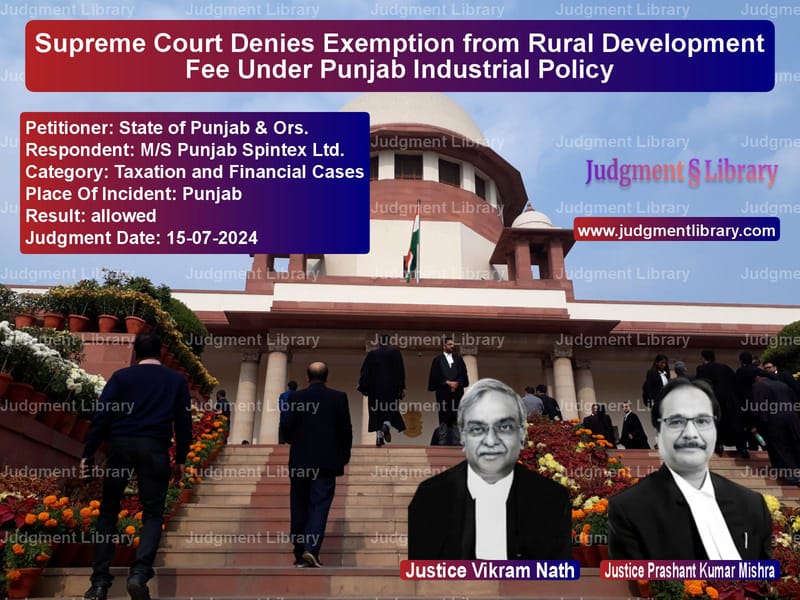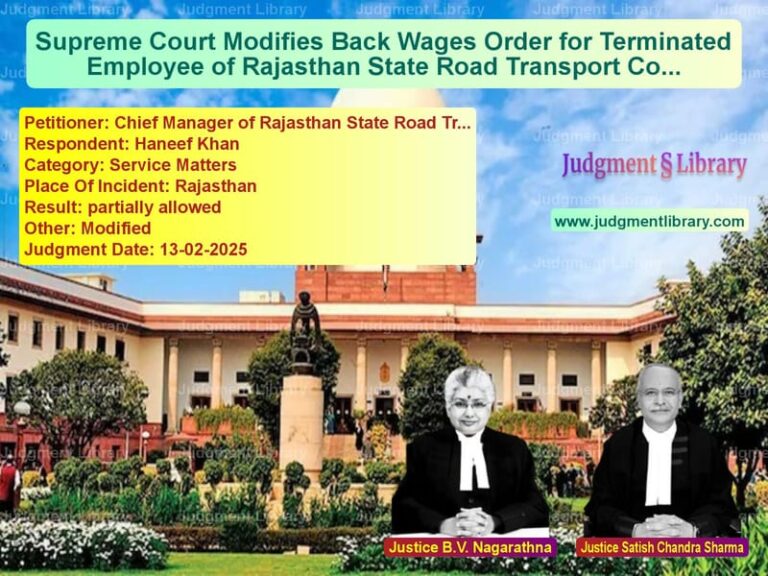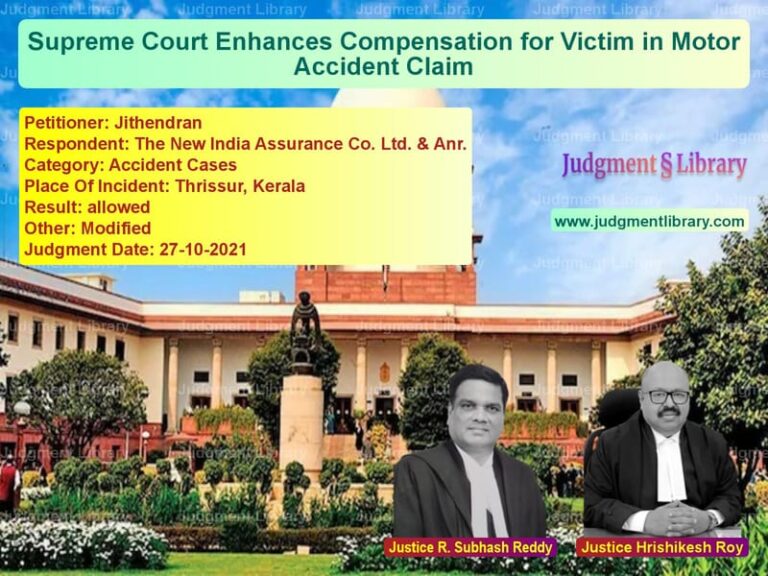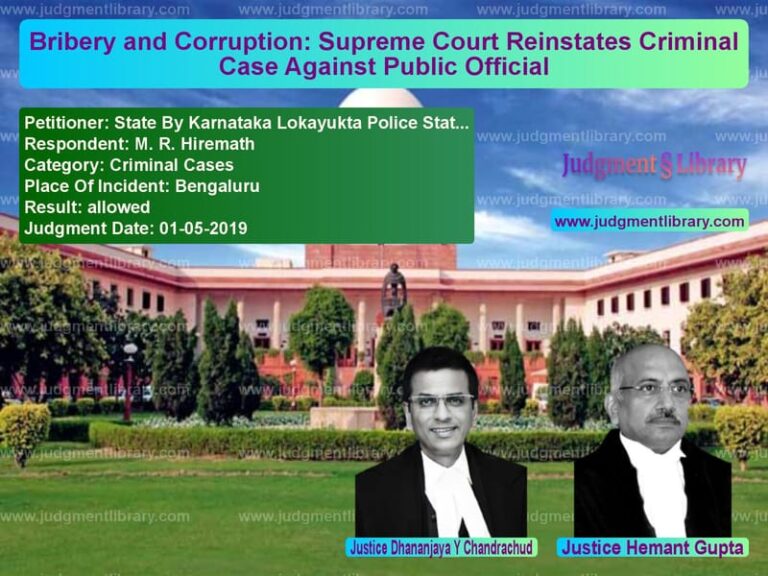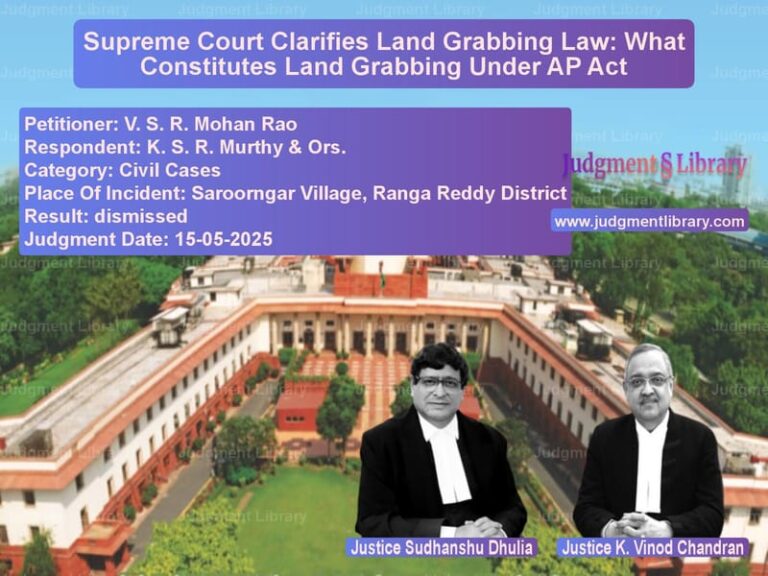Supreme Court Denies Exemption from Rural Development Fee Under Punjab Industrial Policy
The case of State of Punjab & Ors. vs. M/S Punjab Spintex Ltd. revolves around the issue of whether exemption from Market Fee under the Punjab Industrial Policy, 2003, also includes exemption from Rural Development Fee. The Supreme Court ruled that these two fees are distinct and cannot be assumed to be covered under the same exemption. This decision clarifies the interpretation of industrial incentives provided under state policies.
Background of the Case
The respondent, M/S Punjab Spintex Ltd., is a company incorporated in 2006 that set up a spinning unit in Bathinda, Punjab, for manufacturing cotton yarn. Seeking financial benefits under the Punjab Industrial Policy, 2003, the company applied for exemption from Market Fee and Rural Development Fee.
The Punjab government had earlier granted such an exemption to M/s Partap Furane Pvt. Ltd., a similar entity. The respondent argued that it was similarly situated and should also receive the same benefit.
The Punjab and Haryana High Court initially ruled in favor of the respondent, dismissing the state’s objections and stating that Market Fee exemption should extend to Rural Development Fee as well. The Punjab government, aggrieved by this decision, challenged it before the Supreme Court.
Petitioner’s Arguments
The State of Punjab contended:
- Market Fee and Rural Development Fee are governed by separate statutes—the Punjab Agricultural Produce Markets Act, 1961, and the Punjab Rural Development Act, 1987, respectively.
- The Industrial Policy, 2003, explicitly mentioned exemption from Market Fee but made no reference to Rural Development Fee.
- Allowing automatic exemption from Rural Development Fee would set a precedent beyond the intended scope of the policy.
- Granting such an exemption without specific government approval would result in significant financial losses to the state.
Respondent’s Arguments
The respondent, M/S Punjab Spintex Ltd., countered:
- Both Market Fee and Rural Development Fee serve similar functions, and their exemption should be interpreted collectively.
- The Punjab government had previously granted similar exemptions, which indicated an established policy approach.
- There was no logical basis to exempt Market Fee while retaining Rural Development Fee for the same category of businesses.
- The state’s denial of exemption was arbitrary and violated the principles of industrial promotion under the 2003 Policy.
Supreme Court’s Observations
The Supreme Court examined the legal basis for the exemptions and observed:
“The exemption from Market Fee under the Industrial Policy, 2003, does not automatically extend to Rural Development Fee. These are distinct statutory levies under separate legislative frameworks.”
The Court further noted:
“Exemptions must be granted strictly within the boundaries of policy provisions. Courts cannot expand the scope of an exemption beyond its textual interpretation.”
The Court also pointed out that past exemptions granted by the Punjab government were based on administrative decisions and could not serve as a binding precedent for future cases.
Final Verdict
The Supreme Court ruled:
“The appeals are allowed. The impugned orders of the Punjab and Haryana High Court are set aside. The exemption granted to the respondent from Rural Development Fee is invalid.”
The Court dismissed the respondent’s claim and upheld the state’s authority to levy both Market Fee and Rural Development Fee independently.
Implications of the Judgment
This ruling has significant implications for businesses and policymakers:
- Clarification on Fee Structures: The judgment clarifies that Market Fee and Rural Development Fee are distinct and must be dealt with separately.
- Strict Interpretation of Industrial Policies: Incentives granted under industrial policies must be explicitly mentioned and cannot be assumed.
- State Authority Reinforced: The ruling upholds the state’s authority to determine exemptions and financial incentives based on policy provisions.
- Legal Precedent for Future Cases: Businesses seeking exemptions under state policies must ensure their claims align strictly with the policy’s wording.
Conclusion
The Supreme Court’s decision in this case reaffirms the principle that statutory exemptions must be explicitly stated and cannot be assumed based on past administrative practices. This judgment serves as a guiding precedent for future disputes involving tax and fee exemptions under government policies.
Petitioner Name: State of Punjab & Ors..Respondent Name: M/S Punjab Spintex Ltd..Judgment By: Justice Vikram Nath, Justice Prashant Kumar Mishra.Place Of Incident: Punjab.Judgment Date: 15-07-2024.
Don’t miss out on the full details! Download the complete judgment in PDF format below and gain valuable insights instantly!
Download Judgment: state-of-punjab-&-or-vs-ms-punjab-spintex-l-supreme-court-of-india-judgment-dated-15-07-2024.pdf
Directly Download Judgment: Directly download this Judgment
See all petitions in Income Tax Disputes
See all petitions in GST Law
See all petitions in Tax Evasion Cases
See all petitions in Banking Regulations
See all petitions in Tax Refund Disputes
See all petitions in Judgment by Vikram Nath
See all petitions in Judgment by Prashant Kumar Mishra
See all petitions in allowed
See all petitions in supreme court of India judgments July 2024
See all petitions in 2024 judgments
See all posts in Taxation and Financial Cases Category
See all allowed petitions in Taxation and Financial Cases Category
See all Dismissed petitions in Taxation and Financial Cases Category
See all partially allowed petitions in Taxation and Financial Cases Category

